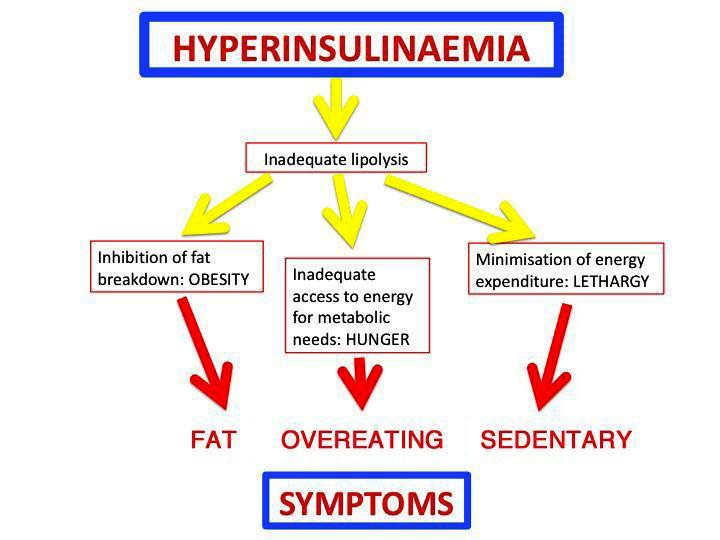Last updated on September 30th, 2022
Have you come across a situation of uneasiness or confusion, anxiety with irritation, increased heart rates, or tingling sensation in your hands? If yes, this could mean your blood sugar levels are low. This could lead to a condition called Hypoglycemia. You need to eat a sugar-rich diet to bring the sugar levels back. Remember it can be fatal if left untreated.
Read the article below to get insights on signs and symptoms, causes and treatment of falling blood sugar levels.

What is Hypoglycemia?
Hypoglycemia is a medical condition where blood glucose levels fall below normal levels. If left untreated it can lead to severe health problems like a coma. One in every 25 patients suffering from type 1 diabetes dies due to severe hypoglycemia. But sugar levels can be managed naturally and one can lead a healthy life by the Diabetes Reversal Method
When the blood sugar levels fall below 70mg//dL it is an indication of Hypoglycemia.
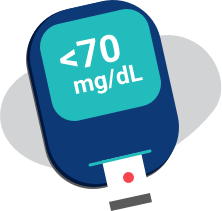
Glucose in our Body:
Blood sugar known commonly as Glucose is the main source of energy. Our body generates glucose after decomposing the food we eat. Our bloodstream absorbs Glucose. It is through the bloodstream it travels to the body cells.
Pancreas produces a hormone known as Insulin in our body.It is the Insulin that helps our body cells to use glucose and give us energy to perform various activities like walking, running, etc.
Summary:
A low level of glucose (below 70 milligrams per deciliter) in our body causes Hypoglycemia. Low Blood Sugar can lead to problems like disturbed sleep, mood swings, fatigue, blurred vision, heart palpitations etc. In severe cases Hypoglycemia might affect our kidneys, lever and you may be at a risk of serious complications. But all this can be prevented and cured by making healthy lifestyle modifications like 1000s of people who have reversed Diabetes and were able to regulate their blood sugar levels.

Causes of Hypoglycemia

Hypoglycemia is more common in patients with diabetes. Due to diabetes, blood sugar levels are high. Insulin injections and medicines help in reducing blood sugar levels. Taking too many doses of medicine or insulin reduces blood sugar levels and causes Hypoglycemia. Other medications like antidepressants also affect blood sugar levels. I have seen patients who were not able to get off antidepressants for a long time. After enrolling for the Diabetes Reversal Program which focuses on meditation and other natural methods of treatment, they are now depression free and enjoying a happy life.
Also Read: Foods to avoid while taking metformin
How Diabetes Mellitus Causes it:
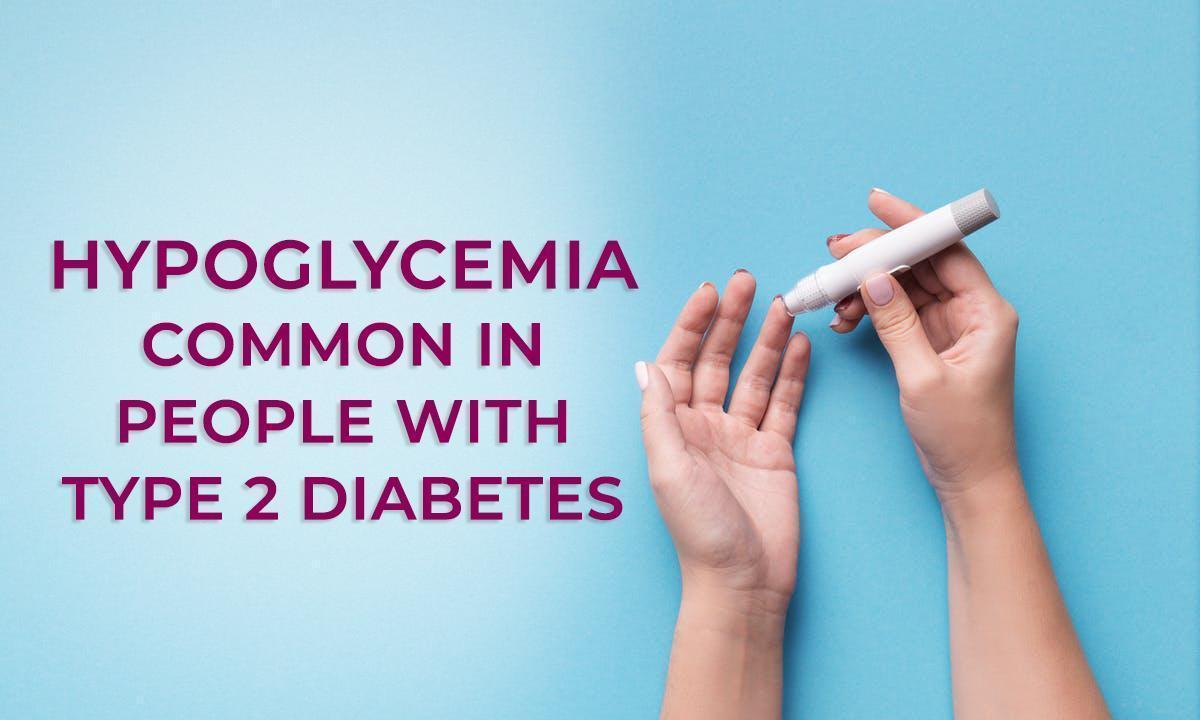
Diabetes is of two types. When the body is producing less insulin it causes Type-1 diabetes. With less insulin, the absorption of glucose from the bloodstream decreases. Thus, there is a rise in blood glucose levels.
In type-2 diabetes, our body becomes less responsive to the insulin hormone. Thus glucose absorption decreases and glucose levels in the bloodstream go high.
Diabetes patients take insulin injections and medicines like Glimepiride, Glipizide, etc.to maintain proper blood glucose level.
At times people forget or skip taking their insulin dose that leads to Hyperglycemia i.e blood sugar levels shoot up. Sometimes they take an overdose of medicines or insulin injection. This causes an imbalance in insulin levels and leads to Hypoglycemia in patients with diabetes.
Summary:
Low insulin production or ineffectiveness to insulin by the body causes Diabetes. Taking too much insulin during diabetes leads to hypoglycemia. A balanced diet, proper fitness regimen with guidance of professional consultants, is a scientifically proven method and has helped 10000+ patients reverse their diabetes.
Also Read: Blood sugar test price in india
Hypoglycemia Causes, Without Diabetes:
People without diabetes can also face the condition of Hypoglycemia. The main causes of hypoglycemia in such situation are:
- Due to medicines: It happens when you consume some medicines accidentally. Some medicines like Quinine which is used to treat malaria can cause hypoglycemia. One should always Consult doctor before consuming such medicines.
- Alcohol consumption: Heavy alcohol consumption on an empty stomach affects the liver. It then affects our blood glucose levels.
- Certain illnesses: Diseases like liver disease, kidney disorders; all impact the blood glucose levels. Therefore such diseases can lead to hypoglycemia.
- Eating disorder: People who eat less or suffer from anorexia nervosa have eating disabilities. Consequently, such people can suffer from hypoglycemia.
- Insulinoma: It is a condition where a tumor grows in the pancreas because of which insulin increases in our body. More insulin causes more glucose absorption and thus decreases glucose levels resulting in hypoglycemia.
- Hormone disorders: Due to disorders in adrenal glands, pituitary glands there is a decrease in glucose production. This leads to low blood sugar levels, causing Hypoglycemia
Summary:
Diabetes, Hormone deficiencies, extreme illness, skipping meals, alcohol consumption are causes of Hypoglycemia. Most of us have read it or are aware of all this. But unable to follow a healthy lifestyle for various reasons like, work load, lack of motivation, proper guidance and more. 1000s of patients have reversed Diabetes by constant push and motivation from our certified coaches. People are happy to get a personalised Diet Plan, including staple food, Fitness regimen- customised in a way that it doesn’t tamper their professional or personal routine. Also, regular follow ups with a Diabetologist acts as a booster in the process of Diabetes Reversal.
Signs and Symptoms
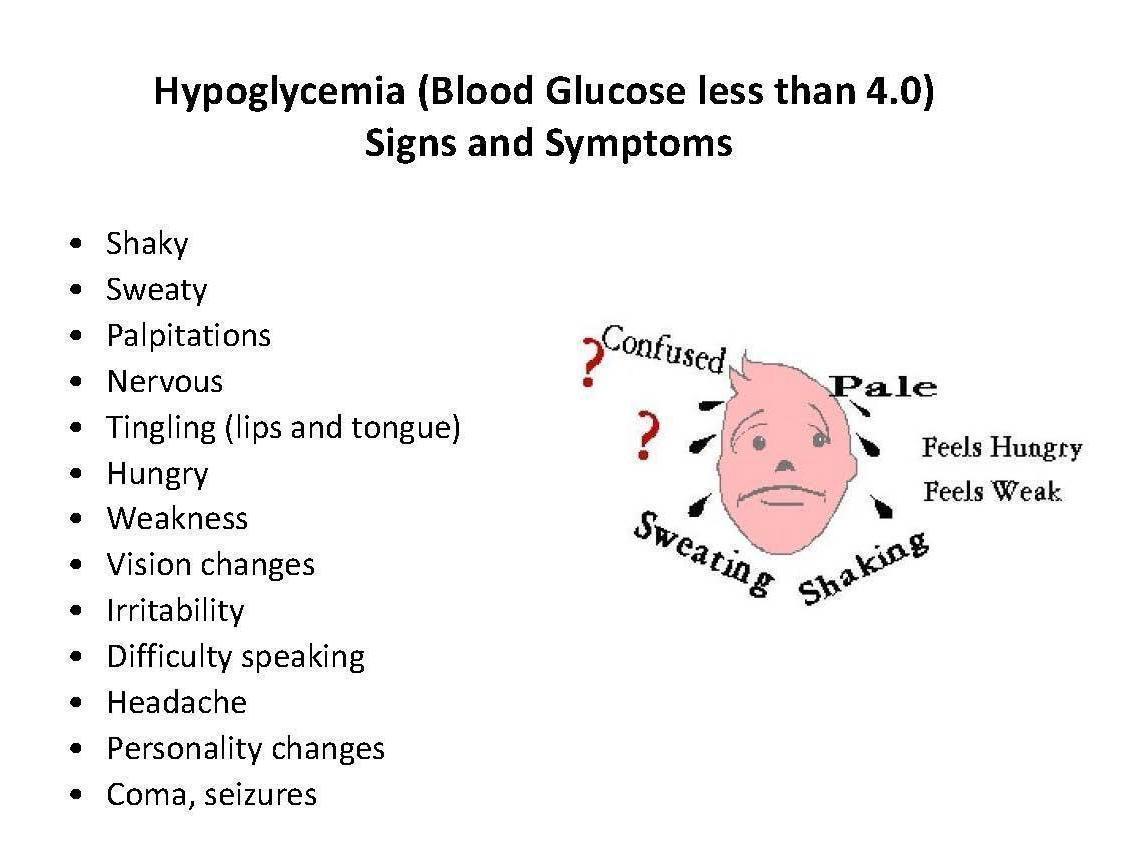
Hypoglycemia signs can be understood through 2 body responses These are:
Adrenergic responses: The counter-regulatory hormones like norepinephrine control this process of Insulin decreasing the glucose levels in the blood. Any change in these hormone levels can decrease the regulation of insulin. Body responds to these changes and these responses serve as the early warning signs of hypoglycemia. These signs are:
- Diaphoresis (too much sweating)
- Dizziness
- Hand tremor
- Anxiety
- Hunger
- Tachycardia (increased heart rate),
Along with Neuroglycopenic response which occurs due to the deficiency of glucose levels within the brain. This results in rapid dysfunction of the central nervous system. The initial signs of this response are:
Neuroglycopenic response
- Headache
- Lethargy
- Confusion
- Disorientation
- Blurred vision
- Speech impairment
Signs of Serious Condition/ Emergency: Ignoring initial signs and symptoms can lead to a bad situation. It is found that it can impact the medullary phase and can cause brain damage. The signs of this phase are:
- Seizures
- Deep coma,
- Bradycardia (slow heart rate),
- Shallow breathing, and
- Pupillary dilatation.
Summary:
Early signs of Hypoglycemia are hunger, anxiety, sweating, irregular heartbeat, and confusion, and hand tremor. The serious condition leads to seizures and coma.
Diagnosis of Hypoglycemia
For diabetes patients:
- Check the blood glucose levels whenever you feel any of the symptoms listed above.
- If the blood glucose reading is below 70 mg/dL, eat fast-acting carbohydrates.
For non-diabetes patients:
- If you don’t have diabetes but still have the symptoms of hypoglycemia, consult a doctor.
- The doctor will try to find out the cause by examining your medical history and symptoms. He will also consider your family history and look out for the possibility of Heredity.
- Blood tests are done if necessary. Blood tests may include glucose levels, hepatitis, deficiency of hormones.
Summary:
For diabetes patients: Monitor your blood glucose levels daily.
For the non-diabetes patient: if you notice any sign of hypoglycemia consult the doctor immediately.
Whether you are diabetic or non-diabetic, living a healthy lifestyle can help you conquer Hypoglycemia and its symptoms. Earlier the better! A sustainable diet plan, proper workout routine and advice from a Diabetologist, along with a lot of motivation is all you need to regulate your blood sugar levels.
Treatment
Hypoglycemia requires quick attention as low blood sugar levels can cause problems like seizures and brain failure. Therefore, general treatment aims to bring the blood sugar levels to normal through food or medicines. The treatment for hypoglycemia varies as per the patient’s condition.
Treatment for Early Symptoms of Hypoglycemia:
Early Hypoglycemia treatment is based on the 15-15 rule. Follow these simple steps to normalise your blood sugar levels-
- When you have early signs of hypoglycemia, eat 15 grams of food like a fast-acting carbohydrate. Due to fast-acting carbohydrates, blood glucose levels increase.
- After 15 minutes check the blood glucose levels again.
- If blood glucose levels are still below the normal, eat again 15 grams of carbohydrate.
Repeat the above simple steps 1 to 3 times till your blood sugar levels are normal. Eat normal meals to maintain the blood sugar levels.
- Some fast-acting carbohydrates are Glucose tablets, raisins, 1 tablespoon honey, jelly beans, 1 tablespoon corn.
- Don’t eat complex carbohydrates or chocolates as they take time to digest. Due to which the rise of blood sugar levels is very slow.
- If the condition remains the same even after repeating the above steps 3 times, consult the doctor.
Also Read: Can you Reverse Type 2 Diabetes?
Treatment for Severe hypoglycemia:
Emergency:
- In an emergency condition, glucagon treatment is given. Glucagon helps in releasing stored glucose from the liver into the bloodstream. Due to this blood sugar levels rise rapidly.
- Glucagon 1 mg is given through intramuscular (IM), or subcutaneous (SC) injection.
- You should be trained in using the Glucagon emergency kit.
Treatment if the patient is unconscious:
- If the patient is unconscious intravenous glucose administration is done as per the recommended dose
- As the patient recovers from unconsciousness, oral glucose can be given.
- It is recommended to admit the patient in severe hypoglycemia condition.
Also Read: Normal Sugar Level
Hypoglycemia Prevention:
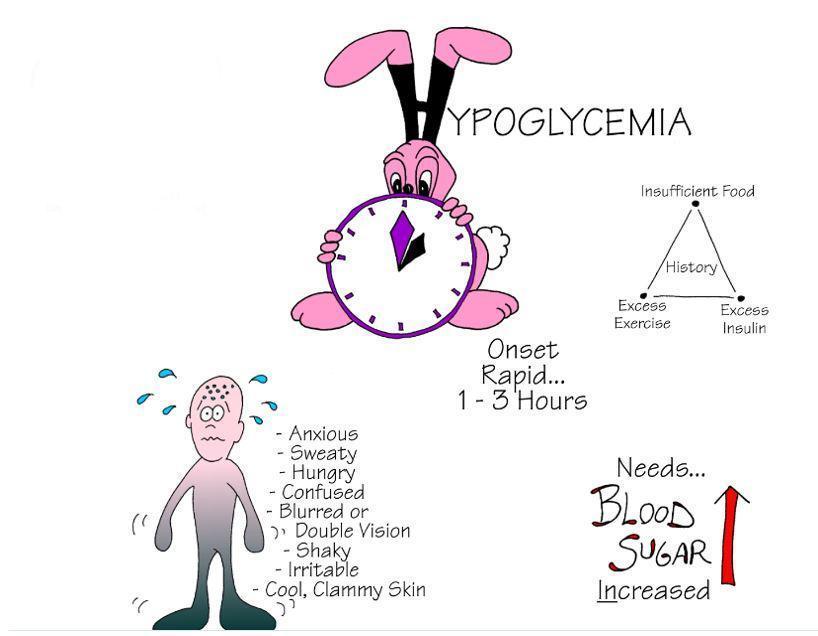
Specific Prevention if you have diabetes:
- Follow the diabetes management plan, you and your doctor have developed. Have a personal Diet Coach who can monitor your food and help you regularise blood sugar levels naturally.
- Before changing any medicines, or food, or exercise, consult your doctor
- Make use of a continuous glucose monitor (CGM) kit and monitor glucose levels daily. Maintain a chart or install an app to make things easier.
- Always keep fast-acting carbohydrate or glucose tablets handy, to treat falling blood sugar levels
Also Read: How to Lower Blood Sugar?
Prevention in general:
To prevent hypoglycemia, follow these steps:
- Monitor your blood glucose level several times a week or twice a day.
- Avoid postponing or skipping a meal or snack. Follow a proper meal plan. Avoid using supplements to fulfill your nutrient requirements. Take help from a Diet Coach who can provide you with a personalised Diet Plan that can be followed for life.
- Measure the dose of medicines carefully, and take it on time. As we read above, skipping an Insulin dose or overdose of the same can lead to serious health problems.
- In case of increased physical activity, adjust your medications and meals depending on the requirement. In the Diabetes Reversal Program, Diet Coach and Fitness Coach work together to give you the best plan that helps in getting your blood sugar to normal levels.
- Carry a medical identification bracelet to help others know that you have diabetes, in case of emergency.
Last But Not Least
To safeguard yourself from the unpleasant symptoms and negative consequences of hypoglycemia, follow the two simple rules:
- Practice good diabetes management plan. Reverse Diabetes naturally at the comfort of your home.
- Monitor your blood sugar level as often as possible.
- Keep a simple carbs rich diet like glucose tablets, an apple, a banana, an orange, etc. with you. Consume it whenever you experience any symptom of Hypoglycemia.
There are patients who have successfully reversed diabetes by making simple modifications that ensure sustained results. Sticking to a healthy regimen has helped them reduce or completely eliminate Insulin and other medications, which looked impossible before they got on a call with us. “It’s never too early nor too late to work towards being the healthiest you.”
FAQ’s:
Last Updated on by Dr. Damanjit DuggalDisclaimer
This site provides educational content; however, it is not a substitute for professional medical guidance. Readers should consult their healthcare professional for personalised guidance. We work hard to provide accurate and helpful information. Your well-being is important to us, and we value your feedback. To learn more, visit our editorial policy page for details on our content guidelines and the content creation process.

 English
English


